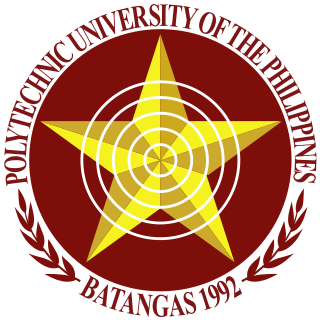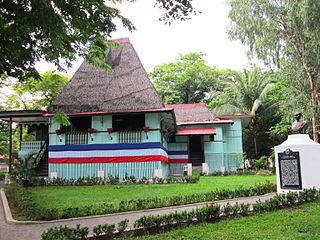
Manila Science High School, colloquially known as MaSci, is a public science high school in the Philippines. It is located at the corner of Taft Avenue and Padre Faura Street in Ermita, Manila. Established on October 1, 1963, it is the first science high school in the Philippines.

Polytechnic University of the Philippines Bataan is a satellite campus of the Polytechnic University of the Philippines located in Elliptical Road, Brgy. Malaya, Freeport Area of Bataan (FAB), Mariveles, Bataan, Philippines. It was established in July 19, 1966 as National Shipyard and Steel Corporation Barrio High School and became a Branch college of PUP in Bataan ten years later on July 1, 1976.
The Polytechnic University of the Philippines College Entrance Test, commonly known as PUPCET, is part of the admission requirements in the Polytechnic University of the Philippines, administered to graduates of Philippine and foreign high schools. It is used to measure the capability of incoming students depending on what degree will the applicant choose. PUPCET is one of the most competitive entrance examinations in the Philippines. Of an estimated 50,000 annual entrance test examinees for the main campus in Manila, only 8,000 will be accepted due to the university's limited budget. Due to covid restrictions this temporarily suspended and implements College Admission Evaluation of Polytechnic University of the Philippines or CAEPUP.

The University of Santo Tomas Faculty of Civil Law or "UST Law" is a law school in Manila, Philippines. It is administered under the jurisdiction of the University of Santo Tomas, the oldest existing university in the Asia. It is one of the three law schools of the University of Santo Tomas in Manila, with the other two being the Faculty of Canon Law and the Graduate School of Law.

Tagum City National High School (TCNHS), formerly known as Tagum Community High School, is a public high school in Tagum, Davao del Norte, Philippines. It was founded in February 14, 1967 to cater to students from Tagum City and the province of Davao del Norte.
Philippine Cultural College is a Chinese Filipino school with three campuses located in Manila, Caloocan and Quezon City, Metro Manila, Philippines, established on June 27, 1923 by the Philippine Chinese Educational Association. PCC is the oldest Chinese Filipino secondary school in the Philippines. It is a non-stock, non-profit, and non-sectarian co-educational education institution offering pre-school, and has a Level II re-accredited status from the Philippine Accrediting Association of Schools, Colleges and Universities (PAASCU) for its grade school and high school. Its programs emphasize in the English, Filipino, and Mandarin Chinese languages, Mathematics, Science, and Information Technology.

La Consolacion College Bacolod, also referred to by its acronym LCCB or simply LCC, is a private, Catholic, co-educational basic and higher education institution administered by the Augustinian Sisters of Our Lady of Consolation (ASOLC) in Bacolod, Negros Occidental, Philippines.

Batangas State University, The National Engineering University is a state university in the province of Batangas, Philippines. Established in 1903 as a training school, Batangas State University is the oldest higher education institution in the region. It was granted a state college status in 1968, renamed Pablo Borbon Memorial Institute of Technology, and was finally elevated into a state university in 2001. At present, the university has eleven campuses in Batangas.

The Polytechnic University of the Philippines The National Polytechnic University is a coeducational state university in Manila, Philippines. It was founded on 19 October 1904, as the Manila Business School (MBS) and as part of Manila's public school system. It was eventually promoted to a chartered state university in 1978, by virtue of Presidential Decree 1341. PUP has more than 20 Campuses across Central Luzon, Southern Luzon and Metro Manila. With over 80,000 enrolled students, PUP claims to be the largest state university in the Philippines by student population.

Polytechnic University of the Philippines Santo Tomas, officially as Polytechnic University of the Philippines – Santo Tomas, Batangas Branch (PUP–STB) is one of the branch campuses of the Polytechnic University of the Philippines located in Santo Tomas, Batangas. PUP–STB was established through a Memorandum of Agreement (MOA) between former PUP President Nemesio Prudente and the Municipal Government of Santo Tomas under Leopoldo Laurel Jr. in 1991. PUP–STB is the only academic institution in Santo Tomas which acts as the community college and serves other municipalities in Batangas and Laguna province.
STI NAMEI, formerly the NAMEI Polytechnic Institute, is a private school in Manila, Philippines. It was established by Don Felix B. Padilla as the Naval Architecture and Marine Engineering Institute (NAMEI) in 1947. In 2019, was acquired by the STI Education Services Group, Inc. and was later renamed as STI NAMEI.

Nemesio "Doc" Encarnacion Prudente was a Filipino educator, political activist, and human rights defender revered for serving as President of the Polytechnic University of the Philippines. Prudente is credited with revitalizing public education in the Philippines by institutionalizing much-needed changes in the state university he led, which will eventually become the largest state university.
What originally started as the Manila Business School that opened in 1904, is now the Polytechnic University of the Philippines, the largest university system in the country by enrollment.

The PUPLHS Chorale is one of the major performing musical groups based in the Polytechnic University of the Philippines. PUPLHS Chorale is the resident choir of the PUP Laboratory High School. Started in 2003, it is now part of a larger group, the PUPLHS Music Collective.

The Apolinario Mabini Shrine is a historic site in Santa Mesa, Manila, Philippines. It is noted for being the residence of Filipino military leader Apolinario Mabini who figured in the Philippine Revolution. Originally situated along the Nagtahan River, the structure was moved to the Polytechnic University of the Philippines main campus in Santa Mesa, Manila in the mid-2000s.
The Ninoy Aquino Library and Learning Resources Center (NALLRC) is the library system of the Polytechnic University of the Philippines composed of libraries providing services to the PUP System. Its headquarters is in the building of the same name, located in Manila, Philippines. NALLRC offers various services and development of programs to its clientele.

The University Center for Culture and the Arts (UCCA) is a non-profit cultural center of the Polytechnic University of the Philippines. The agency is under the Office of the Vice President for Student Services. The UCCA is currently residing at the PUP Theater inside the PUP College of Communication compound.
The Polytechnic University of the Philippines Centennial Year is a yearlong celebration in 2004 celebrating the centenary of the establishment of the Polytechnic University of the Philippines. It was celebrated throughout the system. Colleges and other schools have celebrated their anniversaries in accordance to theme of the Centennial Year: "PUP: Kabalikat sa Pag-aangat ng Antas ng Buhay ng Mamamayan".

The Polytechnic University of the Philippines Student Council (PUP SC) (Filipino: Konseho ng Mag-aaral ng Politeknikong Unibersidad ng Pilipinas) is the official undergraduate student union and collective student representative body of the Polytechnic University of the Philippines Manila campuses. It represents the interests of the students on the university, national, and global issues.


















